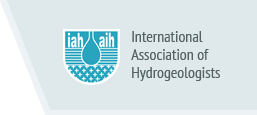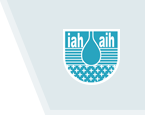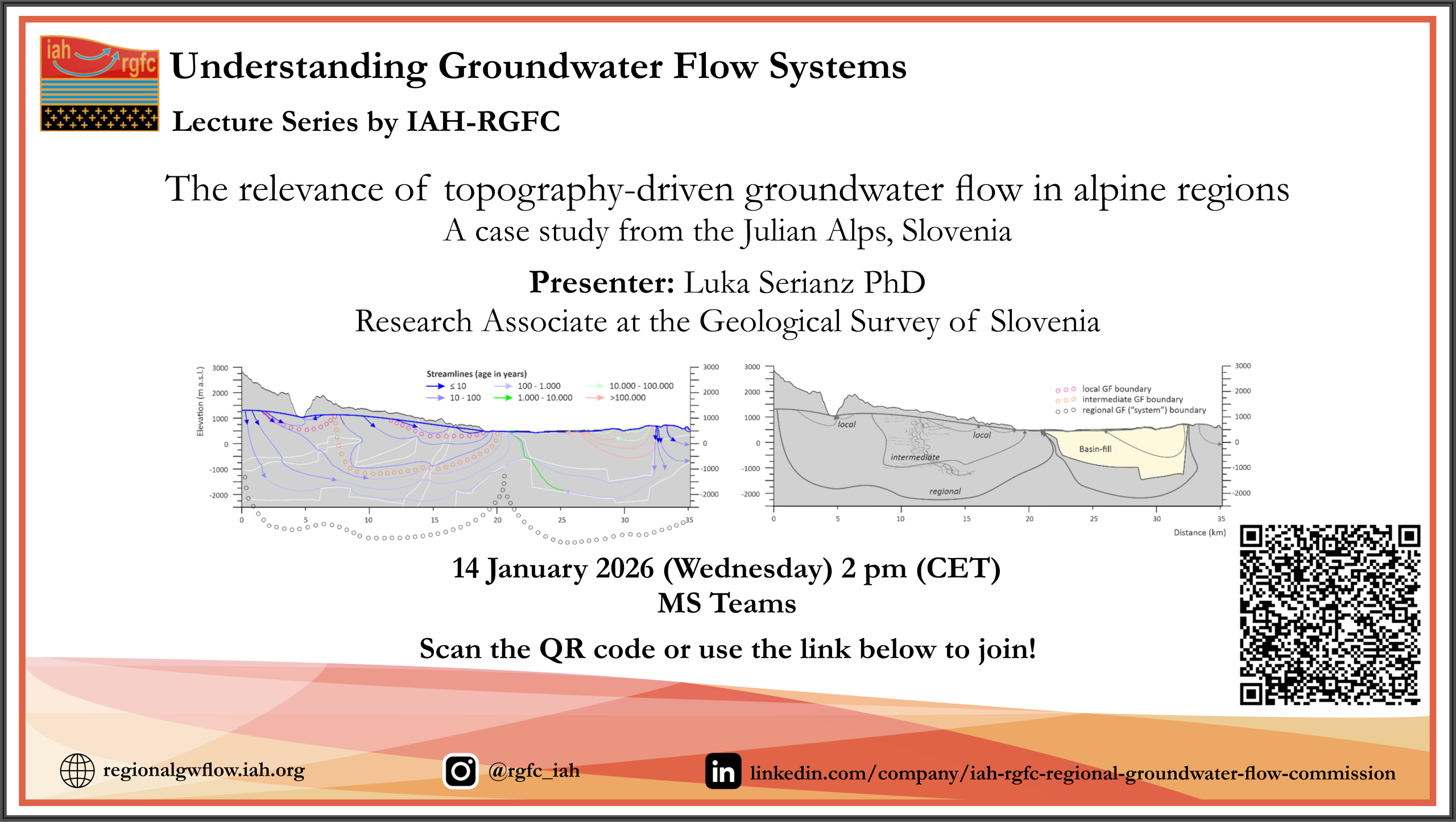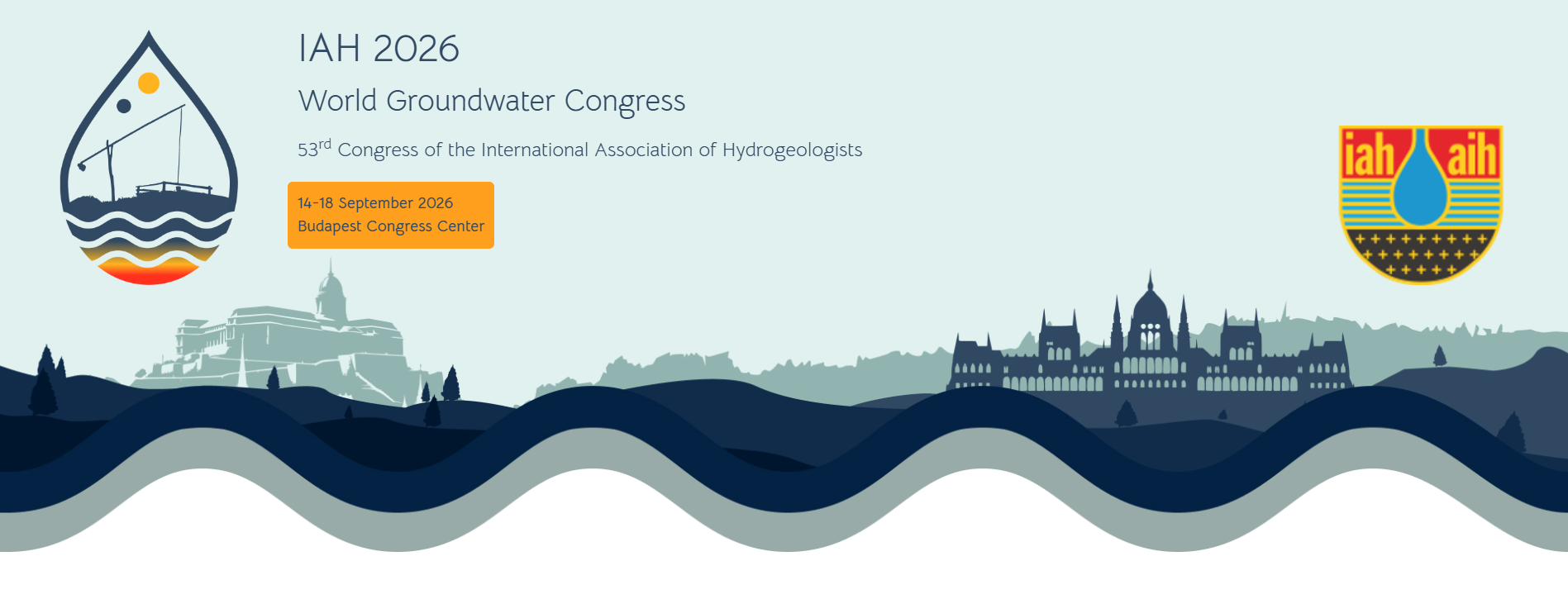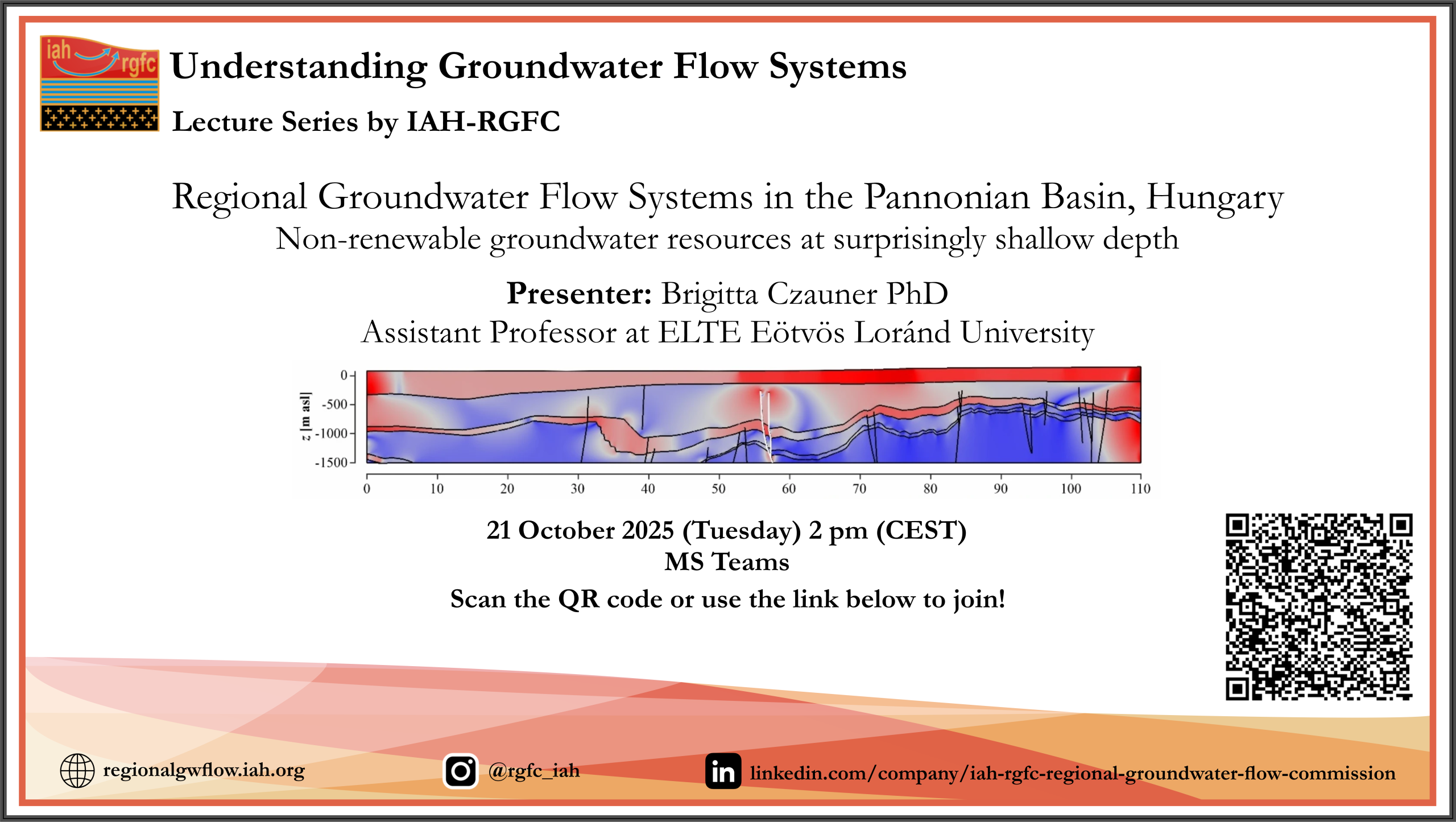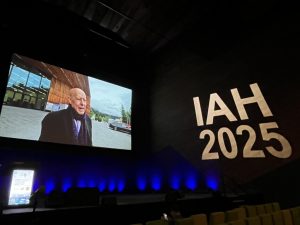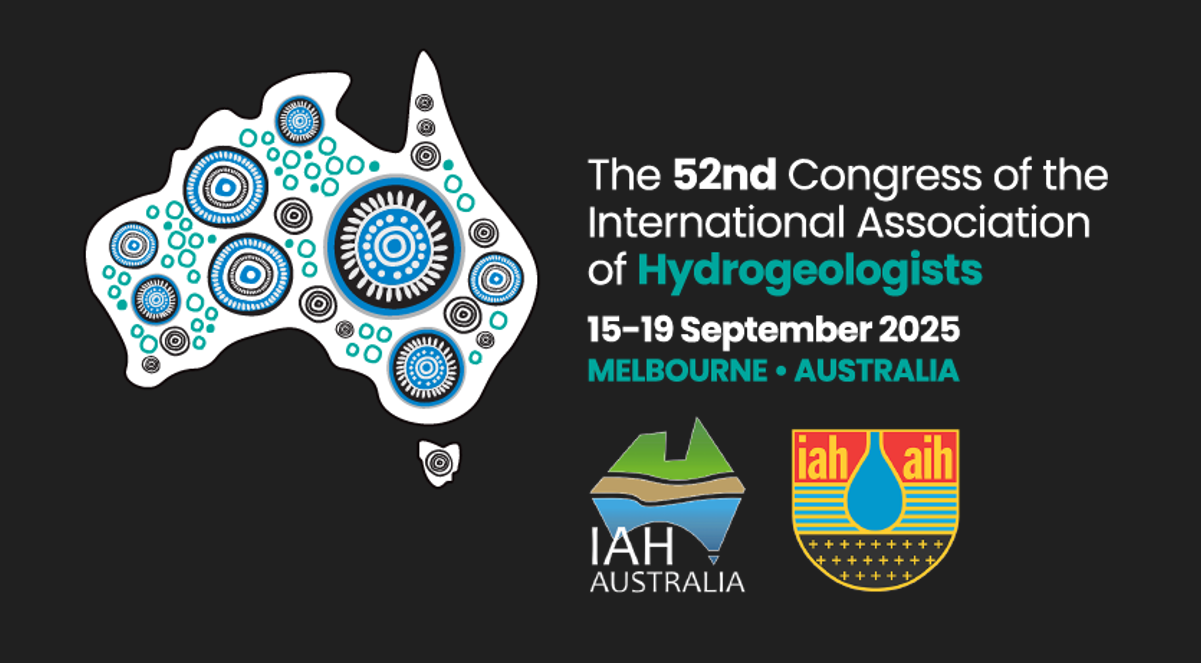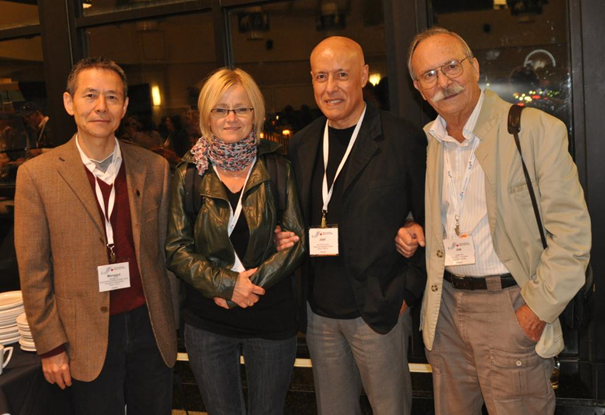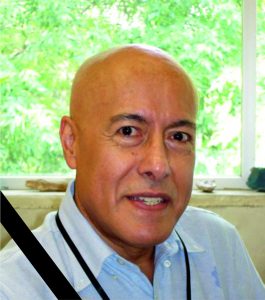News and Announcements
Second Lecture of the IAH-RGFC Lecture Series
The second lecture took place on Wednesday, January 14, 2026, attracting more than 40 participants from around the world. Our speaker, Dr. Luka Serianz (Geological Survey of Slovenia), presented an interesting talk titled: “The relevance of topography-driven groundwater flow in alpine regions: A case study from the Julian Alps, Slovenia”.
If you could not join the lecture live, you can now re-watch the full talk on YouTube via this link.
We thank all participants for joining this successful event and for contributing to the discussion that followed.
The next lecture will follow in March. Updates will be announced on our LinkedIn page. Follow us for more info!
Abstract Submission is Now Open for the Next IAH Congress
The 53rd Congress of the International Association of Hydrogeologists will take place in Budapest from 14 to 18 September 2026.
“The conference focuses on the crucial role of groundwater as a multi-resource essential for environmental sustainability, societal well-being, and resource management. It explores the complex interactions within groundwater systems, including deep and shallow aquifers, karst and fractured rock formations, and processes in the unsaturated zone. The event emphasizes the importance of groundwater in supporting green energy transition, particularly through geothermal and mineral resources.” (Source: https://iah2026budapest.com/)
We are happy to share the news that our YouTube channel is active again! We will regularly upload the recordings from the RGFC Lecture Series, along with other educational videos on regional groundwater flow systems.
Subscribe to stay updated on new content!
Click here to check out our videos: www.youtube.com/@iahrgfc
In Memory of Professor José Joel Carillo Rivera (1943 – 2024)
As we mark one year since his passing, this tribute reflects on the extraordinary life, scientific achievements, and lasting influence of Professor José Joel Carrillo Rivera – a true pioneer and visionary in the field of hydrogeology. His research has profoundly deepened our understanding of regional groundwater flow systems, both in Mexico and worldwide.
Featuring memories and reflections from his colleagues, students, and friends, this short video celebrates his lifelong dedication to science, his generosity as a mentor, and his enduring impact on the international hydrogeological community.
The video was created and coordinated by Samira Ouysse, edited by Mateusz Morawa, with contributions from Professor Carrillo Rivera’s colleagues, students, and friends.
RGFC Session at EGU26 – Call For Abstracts
We are pleased to invite you to present your work at the next EGU General Assembly in 2026 (3 – 8 May 2026) that will be held in Vienna (Austria) and online. We would like to draw your attention to the session proposed by the RGFC. We encourage anyone to submit an abstract by 15 January 2026, 13:00 CET.
Title: HS8.2.12 – Approaches for enhancing sustainable water management and solving environmental issues
Conveners: Stefania Stevenazzi | Co-conveners: Manuela Lasagna, Jim LaMoreaux, Szilvia Simon, Xiao-Wei Jiang
Description: In a context of societal development and increasing demand for natural resources, human needs and environmental impacts must be considered together in order to sustainably manage these resources, especially with regard to groundwater resources. Therefore, a thorough investigation of groundwater availability that inspires sustainable water consumption and facilitates groundwater management is of high importance. This means considering not only the availability and quality of water resources, but also ensuring the preservation of related ecosystems. Moreover, the impacts on groundwater resources, ecosystems and societies due to ongoing climate change should also be considered. The objective of this session is to gather case studies and scientific contributions connected to sustainable management of groundwater and its protection from degradation and deterioration, e.g., due to over-exploitation, competition for water resources, natural or anthropogenic contamination, and climate change. Contributions are invited on, but not limited to, the following subjects: (i) the use of environmental tracers (chemical species and isotopes) for investigating natural processes and human impacts on water resources, (ii) the assessment of hydrogeological budgets for the evaluation of water availability, and (iii) methods for preventing, managing and mitigating harmful environmental impacts related to groundwater, as well as (iv) identifying major existing challenges and critical issues. Contributions may span from local, to regional, to continental scale studies.
Further information about the session: https://meetingorganizer.copernicus.org/EGU26/session/57082
Guidelines on how to submit an abstract: https://www.egu26.eu/authors/abstract_submission.html
See also the registration page for more details: https://www.egu26.eu/attendance/registration.html
New IAH-RGFC LinkedIn Page
The IAH Regional Groundwater Flow Commission (RGFC) now has a new LinkedIn page, a platform created to promote scientific dialogue and share recent publications, research highlights, and insights related to regional groundwater flow systems.
The page aims to encourage discussion among researchers, practitioners, and students interested in groundwater flow systems.
If you have recently published a paper or study relevant to this field, we warmly invite you to share it with the community by contacting our social media coordinator, Petra Baják, via direct message on the LinkedIn page.
Visit us and join the conversation: IAH-RGFC LinkedIn Page
Successful Launch of the IAH-RGFC Lecture Series
We are pleased to announce the successful launch of the IAH-RGFC Lecture Series, which aims to share the latest scientific findings on regional groundwater flow systems and foster discussion within the hydrogeological community.
The first lecture took place on Tuesday, October 21, 2025, attracting more than 30 participants from around the world. Our speaker, Dr. Brigitta Czauner (Eötvös Loránd University, Budapest), presented an interesting talk titled: “Regional Groundwater Flow Systems in the Pannonian Basin, Hungary: Non-renewable groundwater resources at surprisingly shallow depth”.
If you could not join the lecture live, you can now re-watch the full talk on YouTube via this link.
We thank all participants for joining this successful event and for contributing to the discussion that followed.
The RGFC Lecture Series will continue on a bi-monthly basis, featuring speakers from diverse institutions and research backgrounds. Upcoming lectures will be announced on our LinkedIn page. Follow us for more info!
Successful session at IAH 2025, Melbourne, Australia
The 52nd World Congress of the International Association of Hydrogeologists (IAH) was held in Melbourne, Australia, from 15 to 19 September 2025. The conference theme, “Groundwater now and for the future”, reflected the aim of addressing global hydrogeological challenges such as sustainable water management, the impacts of climate change, urbanization, and groundwater quality issues. A special emphasis was placed on incorporating Indigenous knowledge and fostering collaboration with Indigenous communities, which is particularly valuable for uncovering local practices and insights that can support water management and protection strategies. The conference welcomed over 800 participants from around the world.
The special session organized by the IAH Regional Groundwater Flow Commission also took place at the conference. The session was coordinated by Judit Mádl-Szőnyi, Szilvia Simon, Xiao-Wei Jiang, and Samira Ouysse. It brought together research on regional groundwater flow systems from every part of the world. The session also included a tribute to the late Professor Joel Carrillo Rivera, our esteemed posthumous honorary chair.
Tribute to Prof José Joel Carrillo Rivera at the congress
RGFC session at IAH 2025, Melbourne, Australia
We are pleased to share the schedule for the upcoming session proposed by the Regional Groundwater Flow Commission (RGFC) at the 52nd IAH Congress, to be held in Melbourne, Australia (15 September–19 September 2025).
The session, “Regional Groundwater Flow Systems”, chaired by Szilvia Simon and Ben Hall, will take place on 17 September (Wednesday) between 1:30 and 3 pm (AEST).
Presentations include:
◆ Xiaowei Jiang: Mechanisms driving hydrochemical evolution from HCO3-Ca-Mg type to HCO3-Na type water in a sandstone aquifer: evidence from Mg and Ca isotopes
◆ Mohamed Rouai: Geophysical Prospecting of Groundwater in the Middle Atlas of Morocco: Study Case
◆ Carol Sharp: Regional flow systems in karstic aquifers of arid/semi-arid regions
◆ Guanghui Jiang: Distribution of Transboundary Aquifers and the Karst Geological Environmental Problems between China and Vietnam
◆ William Howcroft: The Cambrian Limestone Aquifer in northern Australia: A new perspective on a vast yet understudied resource
◆ Zhi-Yuan Zhang: Stagnation and pseudo-stagnation lines for separating 3D groundwater flow systems in Tóthian basins
For more information, visit the conference’s website: https://iah2025congress.com/program/
Hope to see you there!
Online Tribute Honors the Life and Legacy of Dr. José Joel Carrillo Rivera
On June 30th, 2025, a heartfelt online tribute was held in memory of Dr. José Joel Carrillo Rivera, a distinguished hydrogeologist, dedicated professor, and inspiring colleague. Organized by the Institute of Geography (UNAM), the virtual event reflected the profound impact Dr. Carrillo Rivera had on generations of students, colleagues, and the international hydrogeological community.
On behalf of the Regional Groundwater Flow Commission (RGFC), Dr. Judit Mádl-Szőnyi offered words of remembrance, recalling their shared vision that led to the foundation of the RGFC within IAH at the Niagara Falls Congress in 2012. Since then, Joel served as co-chair from the beginning and remained a guiding force throughout the Commission’s development. His legacy lies not only in his scientific contributions but in his unwavering commitment to understanding and communicating the invisible dynamics of groundwater. He believed that only by understanding flow systems can we truly achieve sustainable groundwater management, especially for the benefit of vulnerable populations in developing regions. We will always remember him for the energy, clarity, and dedication that defined his life’s work.
The tribute closed with personal words from his daughter, Vivien Carrillo.
In memory of Dr. José Joel Carrillo Rivera
It is with great sadness that we share the news with the hydrogeology community that our dear friend, Prof. Dr. José Joel Carrillo Rivera, one of the initiators and Co-Chair of the RGFC-IAH, passed away on October 3, 2024. Dr. Carrillo Rivera was a distinguished hydrogeologist with over 40 years of experience. His contributions to modern hydrogeology, particularly regarding Tóthian groundwater flow systems, have been invaluable. His work at the Institute of Geography at UNAM has advanced scientific understanding and has significantly impacted water management practices in Mexico and internationally.
Dr. José Joel Carrillo Rivera
The RGFC-IAH pays tribute to his memory with the attached memorial and short video.
UNAM’s obituary: https://lnkd.in/eaTHMvxC
Memorial: https://lnkd.in/eYfYAPUC
Short video: https://lnkd.in/eRvve7NW
RGFC session at IAH 2024, Davos, Switzerland
We are pleased to invite you to the upcoming IAH Congress in Davos, 9-13 September 2024. We would like to draw your attention to the session proposed by the Regional Groundwater Flow Commission (RGFC) of the IAH. The session intends to collect any basin-scale groundwater flow-related studies – wherein basin refers to the groundwater basin – in oral or poster form. We encourage anyone to submit an abstract to the submission platform by 29 February 2024.
The session title and details are:
Basin-scale groundwater flow, heat & mass transport processes – Looking beyond individual aquifers to address current hydrogeological challenges
Conveners: Etienne Bresciani, Hanneke Verweij, Xiao-Wei Jiang, Joel Carrillo Rivera, Szilvia Simon, Judit Mádl-Szőnyi
A regional, or basinal approach to groundwater flow and transport from recharge to discharge areas is required for effectively resolving resource issues such as freshwater and energy supplies. This approach contributes to all practical aspects of the UN’s Sustainable Development Goals for water. This session encourages contributions on regional groundwater flow and transport topics such as new approaches and methods in hydrogeologic characterization, advances in modelling techniques, and scenario analysis. The evaluation of uncertainty in predictions, new insights into coupled flow, heat, and/or mass transport systems at the basin scale, and discussions about the concept of regional groundwater flow systems and associated terminology are also welcome. Relevant fields of application include but are not limited to water and energy transition; offshore assessment of fresh groundwater discharge; mountain-block hydrogeology; interpretation of various tracers in groundwater (heat, hydrochemistry, and isotopes); and regional aspects of managed groundwater recharge. Presentations discussing the role of regional groundwater flow systems in the expected transition period due to climate change, intensive extraction, quality concerns, and ecosystem services also align with the session’s objectives. Regional groundwater governance, water conflicts, societal response, and the role of education and outreach will also be considered.
Please, share this information with your colleagues and anyone who might be interested! In case of any questions, feel free to contact us.
Hope to meet you in Davos!
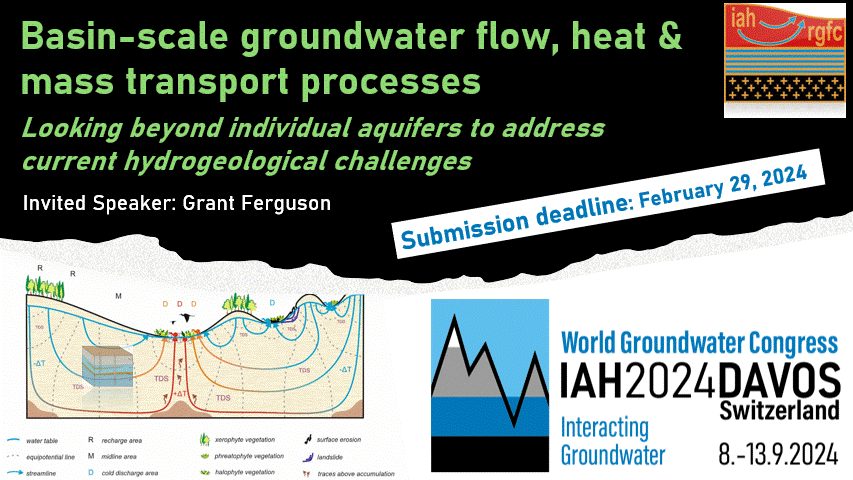
Special Issue “Regional Groundwater Flow Concept and Its Potential for Interdisciplinary Application”
The Special Issue “Regional Groundwater Flow Concept and Its Potential for Interdisciplinary Application” is now completed and published.
The 2022 World Water Day slogan is “Groundwater: Making the invisible visible”, which can help visualise and understand the pattern of groundwater flow. There is a great need for a systematic basin-scale approach to reveal the regional relationships in groundwater. These can open new possibilities for scientists and professionals to understand the frontiers of hydrogeology with different disciplines. The main challenges are connected to climate change and the adjustment of flow systems to modified climate and the buffering capacity of the flow. Over the quantitative aspects, the qualitatives induced by pollution, especially emerging contaminants, are also challenging. Groundwater flow and quality will influence groundwater-dependent ecosystems and the future water supply. Groundwater flow patterns are also significant in exploring geothermal energy and controlling hydrocarbon migration. We await innovative papers on the topic, considering theoretical and practical aspects, regional studies and generalised conclusions.
The Regional Groundwater Flow Commission of the International Association of Hydrogeologists and the National Multidisciplinary Laboratory for Climate Change, RRF-2.3.1-21-2022-00014 project initiated this Special Issue. The guest editors invited contributions from the EGU2023 General Assembly.
Guest Editors:
Dr. Judit Mádl-Szőnyi
Dr. Ádám Tóth
Please visit this website for more information: https://www.mdpi.com/journal/water/special_issues/H4I7230H76
Table of contents:
Tóth, Á.; Baják, P.; Szijártó, M.; Tiljander, M.; Korkka-Niemi, K.; Hendriksson, N.; Mádl-Szőnyi, J. Multimethodological Revisit of the Surface Water and Groundwater Interaction in the Balaton Highland – Implications for the Overlooked Groundwater Component of Lake Balaton, Hungary. Water 2023, 15(6), 1006; https://doi.org/10.3390/w15061006.
Baják, P.; Molnár, B.; Hegedűs-Csondor, K.; Tiljander, M.; Jobbágy, V.; Kohuth-Ötvös, V.; Izsák, B.; Vargha, M.; Horváth, Á.; Csipa, E.; Óvári, M.; Tóbi, C.; Völgyesi, P.; Pelczar, K.; Hult, M.; Erőss, A. Natural Radioactivity in Drinking Water in the Surroundings of a Metamorphic Outcrop in Hungary: The Hydrogeological Answer to Practical Problems. Water 2023, 15(9), 1637; https://doi.org/10.3390/w15091637.
Czauner, B.; Szabó, Z.; Márton, B.; Mádl-Szőnyi, J. Basin-Scale Hydraulic Evaluation of Groundwater Flow Controlled Biogenic Gas Migration and Accumulation in the Central Pannonian Basin. Water 2023, 15(18), 3272; https://doi.org/10.3390/w15183272.
Hunt, M.; Marandi, A.; Retike, I. Water Balance Calculation for a Transboundary Aquifer System between Estonia and Latvia. Water 2023, 15(19), 3327; https://doi.org/10.3390/w15193327.
Männik, M.; Karro, E. Application of Modified DRASTIC Method for the Assessment and Validation of Confined Aquifer Vulnerability in Areas with Diverse Quaternary Deposits. Water 2023, 15(20), 3585; https://doi.org/10.3390/w15203585.
Simon, S.; Déri-Takács, J.; Szijártó, M.; Szél, L.; Mádl-Szőnyi, J. Wetland Management in Recharge Regions of Regional Groundwater Flow Systems with Water Shortage, Nyírség Region, Hungary. Water 2023, 15(20), 3589; https://doi.org/10.3390/w15203589.

